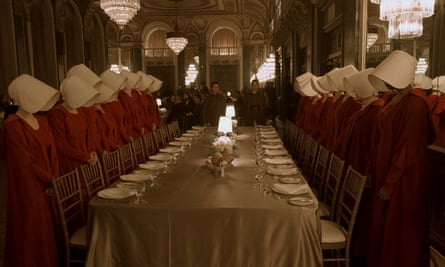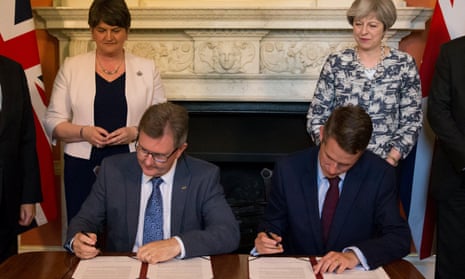‘We are two legged wombs, that’s all: sacred vessels, ambulatory chalices.” That’s how Offred, narrator of Margaret Atwood’s The Handmaid’s Tale – of which the brilliant dramatised version is now showing on Channel 4 – recognises her role as a fertile woman in Gilead, a theocratic republic with a birthrate problem.
In Gilead grim “aunts” use electric cattle prods and selected biblical precepts to force other women to submit to their destiny as breeders. “Blessed are the meek,” Aunt Lydia tells Offred.
Within the United Kingdom, by contrast, Northern Ireland politicians get to control their female population via the infinitely less demanding mechanism of devolved power. Ask, anyway, why women in this particular region are denied abortions unless pregnancy might, as a minimum, cause serious harm, and the answer, at least from experts keen to mansplain on the province’s behalf, is that health is a devolved power, and abortions are a health matter therefore what do you expect, love – human rights?
Petitioners for equal treatment are presented, instead, with the gracious Westminster welcome for the DUP’s abortion police, such as Jeffrey M Donaldson, pictured last week celebrating May’s £1bn bribe. It’s Donaldson, an Orange Order member with a fondness for late-night videos, who, as one of May’s over-warmly addressed “honourable friends”, must now have hopes for reform – of the mainland law. “The fact is that eight million unborn children have not had the opportunity of life because of bad legislation in this House”, he once told the Commons. Blessed be the fruit, as they say in Gilead.
The newly established provision for Northern Ireland women to have free NHS terminations on the mainland, an impressive win by Stella Creasy, does not, as Justine Greening assured guardians of the unborn, mean granting reproductive choices to their worst enemies – women. Within the province, women’s bodies will – with the threat of life sentences for the disobedient – remain, in effect, under patriarchal control. You could argue, in fact, that this change in the law, by making the province’s female population appear a little less victimised, has made May’s DUP controllers look a little less punitively coercive. Blessed be the bribed.
Also safe from contamination, so long as Arlene Foster, Aunt Arlene (as I can only, now, think of her), invokes the “petition of concern” which allows her party to impose its orthodoxies on the entire population of Northern Ireland, is the devolved prohibition on same-sex marriage.
Despite an overwhelming majority of people within the province now expressing support for marriage between people who would be known in Gilead as “gender traitors”, Aunt Arlene and her companions still consider this a biblical transgression too far. Semi-detoxified by May, she acquires a platform from which to address a group she identifies as the “metropolitan liberal elite”, on the pluses of equality, Northern Ireland style. Similarly, her junior minister, Ian Paisley Jnr, may yet be emboldened by May’s partiality to explain how he reconciles a view of homosexuality as “immoral, offensive and obnoxious” with his desire for a more prayerful world.
In fairness to Paisley, England, Scotland and Wales also have their fair share of prayerful busybodies, some honest, some not, about wanting to dictate on private ethical questions to non-co-religionists. But as the unhappy exit of Tim Farron demonstrated, religious convictions, when they seem to censure fellow citizens, appear to be less and less appreciated.
Considering the ease with which Farron was represented during the election as a homophobic fanatic – an accusation he failed miserably to deflect – May’s collusion with a gang of actively homophobic pro-lifers who genuinely regard women as two-legged wombs has gone almost miraculously well.
And if nothing else, the Faustian transaction at least gives May a transparently unforgivable crime to boast about, when she’s invited to improve on illicit running. What’s the naughtiest thing you’ve ever done? Dear me, it was probably that time I used £1bn of public money to bribe 10 wannabe theocrats who would like, if they could, to repeal the 1967 Abortion Act, just so I could stay in power for another six months. And do you know the funniest thing about it? It means women taxpayers were effectively subsidising their own persecutors!
George Osborne may sneer, May might add, but his own best shot at mocking feminist pretensions was to create a “tampon tax” on sanitary necessities, of which £250,000 was awarded by the DCMS to the anti-abortion group, Life.
David Cameron, meanwhile, gave us, in Jeremy Hunt, a health secretary who no doubt still feels, where the abortion limit is concerned, that “12 weeks is the right point for it”. Nothing religious, he insisted. It just kind of feels right, to the NHS chief, that 12 weeks is when a pregnant woman should surrender physical autonomy to the authorities, beyond the point where she’s still allowed to ask two doctors to approve termination.

Without that permission, abortion – a proced-ure experienced, it is thought, by one in three British women – remains a criminal act.
If dedicated services exist to make the required acts of supplication, which defeat some vulnerable women, as painless as possible, a renewed proposal for decriminalisation, from the BMA, was a reminder, in the same week that the DUP literalists struck their deal, of how submissively most British women have, for half a century, tolerated this valuation of their intelligence and autonomy.
In a new preface to The Handmaid’s Tale, Atwood recalls wondering about its premise. “Would I be able to persuade readers that the United States of America had suffered a coup that had transformed an erstwhile liberal democracy into a literal-minded theocratic dictatorship?” Let’s remember what May’s new ally, the DUP’s Donaldson, feels about the 1967 Abortion Act. “I know that Northern Ireland is on the right side of history, because we refused to accept that legislation,” he has said. “I think that, when it comes to the wrong side of history, time will tell, and the judgment will come.”
If May now considers it defensible, as a means to power, to rely on people who feel like Donaldson about abortion for rape victims, history must indeed seem to be on the DUP’s side. Praise be.
In the circumstances, a leadership apology is probably in order. Just as some penitents feel they underestimated Jeremy Corbyn’s capacity for power-hungry shamelessness, I would not have believed May, whom I wrongly imagined to be essentially decent – if frighteningly inept – capable of preserving her position via deals, financial and moral, with the custodians of Northern Ireland’s reproductive mini-dystopia. Gilead’s female collaborators have, for an alternative, death in the colonies. Aunt Theresa has life as a Waspi, in Sonning.
As for the DUP, its religious experts presumably have an answer to Exodus 23:8. “Thou shalt take no gift: for the gift blindeth the wise, and perverteth the words of the righteous.”
Even a member of the metropolitan liberal elite knows it didn’t work out too well for Judas. But maybe if lots of the bribe money comes from people you consider immoral, offensive and obnoxious, it doesn’t count.

